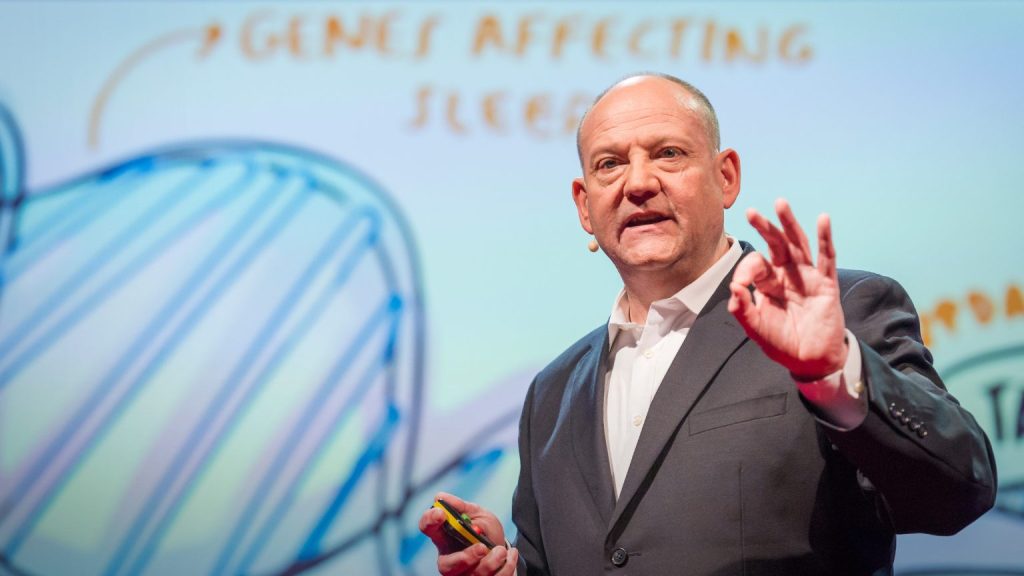36% of your life will be spent asleep. If you live to be 90 years old, that’s 32 years!
– Dr. Russell Foster

While sleep is clearly important, most of us don’t give it a second thought.
But, why exactly do you sleep?
In his TED talk, Oxford University circadian neuroscientist, Dr. Russell Foster, explains why.
“Sleep has been likened to an upgrade from economy to business class. It’s not even an upgrade from economy to first class. The critical thing to realize is if you don’t sleep you don’t fly. Essentially you never get there.”
Keep reading to learn about why you need to obey your body clock and sleep 7-9 hours per night, and more importantly, what will happen to you if you don’t.
What’s this Dr. Russell Foster TED Talk All About?

As Dr. Russell Foster points out early in this TED Talk:
“We have treated sleep as an illness almost, as an enemy. At most, now I suppose we tolerate the need for sleep and at worst, perhaps many of us think of sleep as an illness that needs some sort of a cure. And our ignorance about sleep is quite profound.”
Dr. Foster studies sleep, sleep cycles, sleep disruption, and the neuroscience of sleep. His main focus is circadian rhythms (the internal body clock).
Dr. Foster and his team have made major contributions to science in their discovery of photosensitive retinal ganglion cells which provide input to the circadian rhythm system.
In this TED talk, Dr. Foster explains scientists’ theories about why you sleep and what they know for sure about the effects of poor sleep.
He notes that people’s attitudes toward sleep since the invention of the light bulb are wildly different from pre-industrial times when sleep was intuitively valued.
Our world has changed but our body clocks haven’t.
Even since 1950, it has gotten worse, with most adults now sleeping 90 minutes less per night.
The good news is that if you watch Dr. Foster’s TED talk, you’ll have a much better idea as to why sleep is important, so you’ll be more inclined to improve it.
Dr. Russell Foster Gives 3 Theories About Why We Sleep
It’s clear that sleep has an important role in everyone’s life — most people do it every night. But why you sleep isn’t all that clear.
Here are some of the top theories according to Dr. Russell Foster.
Reason 1: Restoration

When normal people sleep, scientists believe it is the time when the brain can recover and restore itself.
As Dr. Russell Foster puts it:
“All the stuff we’ve burnt up during the day, we restore, we replace, we rebuild during the night.”
This is an important process for us to assure that we can wake up the next morning feeling refreshed.
Dr. Foster goes on to explain:
“Within the brain a whole raft of genes has been shown to be turned on only during sleep. Those genes are associated with restoration and metabolic pathway.”
This means there’s good evidence for the restoration process hypothesis.
Reason 2: Energy Conservation

Dr. Foster analogizes that sleeping is like a hot dog bun, it’s 110 calories.
Basically, this theory says you sleep to save calories, around 110 calories on average to be exact.
According to research, you do save calories when you sleep but Dr. Foster questions whether the cost/benefit of this caloric savings is really worth it.
He makes it clear that he is not a major proponent of this reason but still explains that it may have some place in the complexity of why you sleep.
Reason 3: Brain Processing and Memory Consolidation

As Dr. Foster explains, if you teach a task to someone then deprive them of sleep, they’ll find it much harder to learn the task.
He goes on to say:
“Our ability to come up with novel solutions to complex problems is hugely enhanced by a night of sleep, in fact it has been estimated to give us a 3-fold advantage.”
That’s a big deal if you are someone who aims to solve problems.
Scientists believe sleep is absolutely critical for creativity and memory formation.
What Happens to You if You Don’t Get Enough Sleep?

To start on a serious note, untimely death is very much a possibility.
While you can go nearly a month without food and a few days without water, the amount of time you can go without sleep is measured in hours.
When you don’t get enough sleep, your brain starts to shut off involuntarily.
“The brain indulges in micro sleeps, this involuntary falling asleep, and you have essentially no control over it[…]Microsleeps can be somewhat embarrassing but they can also be deadly. It’s been estimated that 31% of drivers will fall asleep at the wheel at least once in their life. 100,000 accidents [per year] on the freeway have been associated with tiredness, loss of vigilance, and falling asleep. 100,000 per year [in America].”
On a more catastrophic level, Dr. Foster explains that in the investigations following the Chernobyl meltdown and the Challenger Space Shuttle crash, lack of sleep and extended shift work hours were both cited as contributory causes to the tragic disasters. This led to stricter regulations but many issues persist.
There are other less immediately fatal effects that you may be feeling every day if you are not sleeping well.
When you’re tired and lack sleep, Dr. Foster explains that you have poor memory, poor creativity, increased impulsiveness, reduced productivity, and overall poor judgment.
Want to lose weight? Sleep has an effect on that too. Obesity is linked to poor sleep.
As Dr. Foster puts it:
“If you sleep 5 hours or less, you have a 50% likelihood of being obese. What’s the connection here? Well, sleep loss seems to give rise to the hormone ghrelin, the hunger hormone… It gets to the brain the brain says, I need carbohydrates and what it does is seek out carbohydrates and particularly sugars. So there’s a link between tiredness and the metabolic predisposition for weight gain.”
Poor sleep and stress are also intertwined. If you are not sleeping well, it puts undue stress on your body. Sustained stress leads to suppressed immunity.
Dr. Russell Foster explains that tired people tend to have overall higher rates of infection. Plus, there are some very thorough studies showing that shift workers have higher rates of cancer.
What’s more, increased stress levels throw glucose into the bloodstream which can lead to Type 2 Diabetes.
As Dr. Foster explains, the effects of poor sleep extend well beyond mild cognitive issues.
How Do You Know If You’re Getting Enough Sleep?
If you want to know if you’re getting enough sleep, Dr. Foster puts it simply:
“If you need an alarm clock to get you out of bed in the morning, if you are taking a long time to get up, if you need lots of stimulants, if you’re grumpy, if you’re irritable, if you’re told by your work colleagues that you’re looking tired and irritable, chances are, your sleep deprived. Listen to them, listen to yourself.”
How to Improve Sleep According to Dr. Russell Foster

Good news, there are lots of ways that you can sleep better at night.
Follow Dr. Foster’s advice:
“Make your bedroom a haven for sleep. Make it as dark as you possibly can and also make it slightly cool. Reduce your amount of light exposure at least half an hour before you go to bed. Light increases levels of alertness and will delay sleep. What’s the last thing most of us do before we go to bed? We stand in a massively lit bathroom looking into the mirror cleaning our teeth. It’s the worst thing we could possibly do before going to sleep.”
Your sleep environment is critical and having lots of bright lights around you at bedtime is not helpful. Your biological clock is extremely sensitive to light.
Also, examine your relationship with electronic devices.
As Dr. Foster says:
“Turn off those mobile phones. Turn off those computers. Turn off all those things that are going to excite the brain.”
Likewise, cool it with the caffeine and stimulants. As Dr. Foster advises:
“Try not to drink caffeine too late in the day, ideally not after lunch.”
Final thoughts from Dr. Russell Foster
Dr. Foster urges you to make sleep a priority not only for the quality of your life but because the price you pay for not sleeping well may be your life.
As Dr. Russell Foster puts it:
“If you have good sleep it increases your concentration, attention, decision making, creativity, social skills, health. It decreases your mood change, stress, anger, impulsivity, and tendency to drink and take drugs.”
Give your body the opportunity to do something that it already desperately wants to do.
If you’d like to catch everything Dr. Foster has to say, check out the full TED Talk here.

Welcome to Snoozerville! I’m Dr. Alex Hartley, your guide to the world of restful sleep. With a Ph.D. in Sleep Science and years of experience as a sleep therapist, I’ve dedicated my life to understanding and improving sleep quality. My passion lies in uncovering the mysteries of sleep and sharing practical, science-backed advice to help you achieve the best rest possible. Beyond my academic pursuits, I’m an advocate for mindfulness and relaxation techniques, which I incorporate into my daily routine. At Snoozerville, I aim to transform your nights, combining the latest research with easy-to-implement tips. Whether you’re a chronic insomniac or just looking to improve your sleep hygiene, join me on this journey towards peaceful, rejuvenating sleep.

